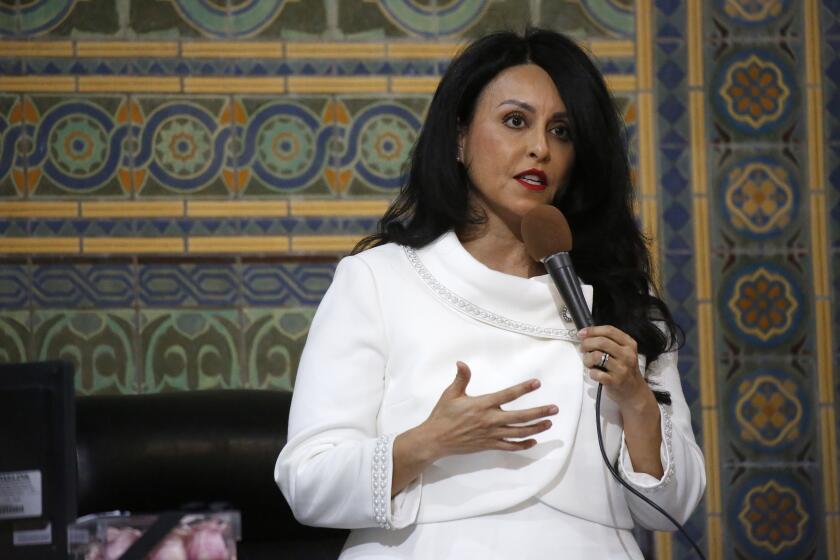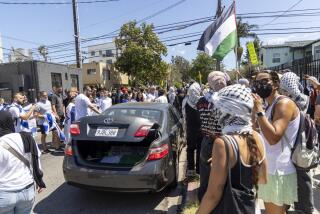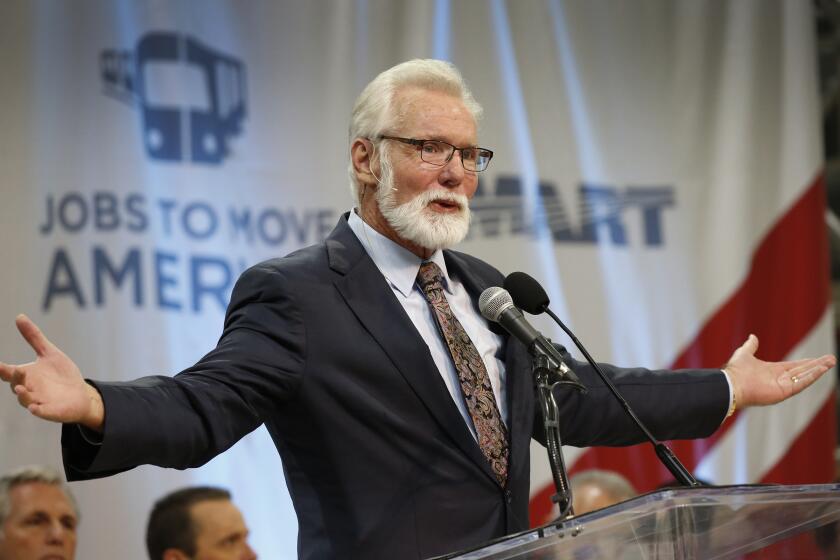L.A. City Council moves to limit protests outside private residences
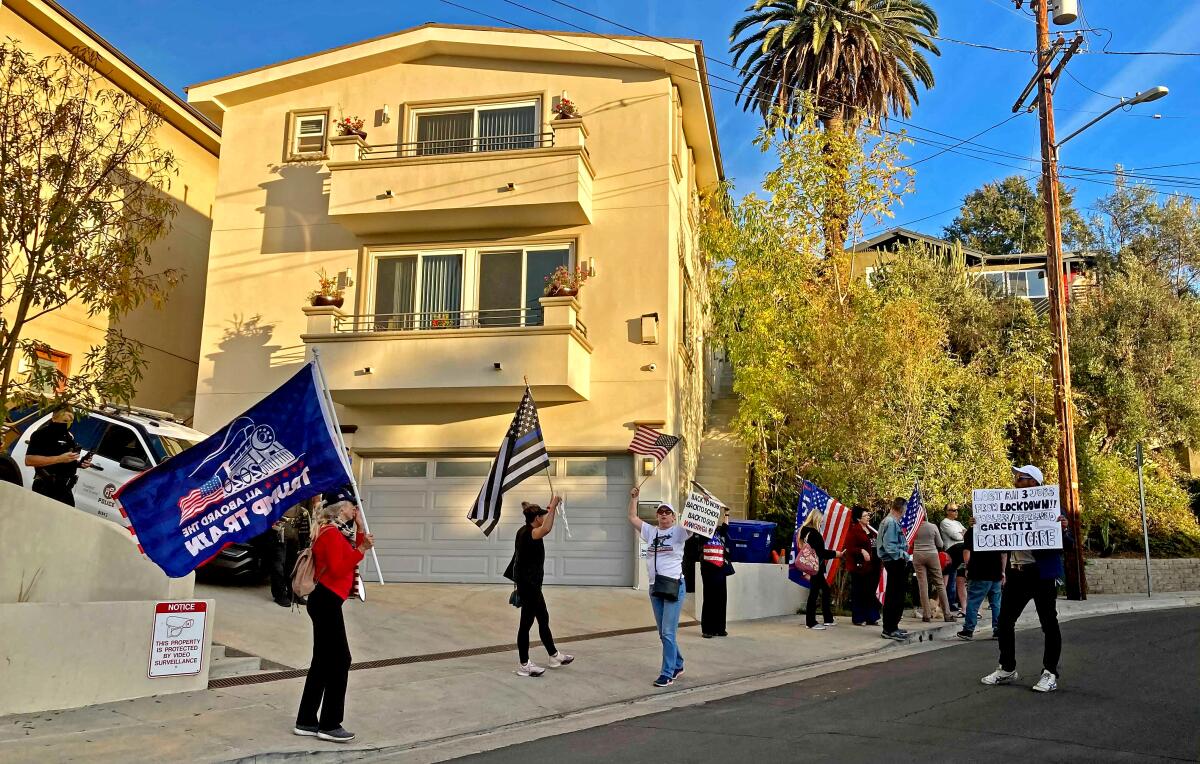
- Share via
For a year and a half, protesters on both the left and the right have targeted public officials at their homes in Los Angeles, demonstrating at all hours to express their grievances over mask mandates, rent forgiveness and other issues.
Now, the City Council is seeking to tighten the rules around such protests. The council, on a 13-1 vote, ordered city attorneys on Tuesday to draft a law that would bar protesters from coming within 300 feet of a target’s home.
Council President Nury Martinez, who introduced the proposal, told her colleagues that protesters visited her home Sunday night and screamed obscenities into her daughter’s bedroom window and used a bullhorn to make threats.
“I’m just completely done,” said Martinez, whose Sun Valley home was also targeted earlier this year by individuals who vandalized her car, according to video of the incident.
Councilman Mitch O’Farrell, whose home is regularly targeted by demonstrators, said his neighbors in Glassell Park have had to endure noisy protesters and profane language. “Enough is enough,” he said.
The council’s proposal instructs city attorneys to draft a law modeled after one in San Jose. Martinez’s motion notes that the San Jose ordinance has survived legal challenges.
L.A. has an existing law prohibiting “targeted demonstrations” within 100 feet of a private residence. The law does not ban “peaceful picketing or distributing pamphlets, going door-to-door, alone or in groups, in residential neighborhoods.”
Some City Council members said Tuesday that they weren’t aware of the existing law.
Councilwoman Nithya Raman, who lives in Silver Lake, cast the lone vote against the proposed ordinance. At Tuesday’s meeting, she said she agrees that council members’ children “shouldn’t have to feel fear in their own homes” when protesters show up. But she argued that the city already has rules prohibiting targeted demonstrations.
“I would be much more interested in having a conversation about how to enforce that existing ordinance and what is missing in that ordinance to make it effective,” she said.
Los Angeles Police Chief Michel Moore said the city already enforces the 100-foot rule — for example, by seeking “voluntary compliance” from protesters. Officers also enforce laws that deal with amplified sound and verbal threats.
Protestors angry about a wide array of issues have targeted politicians’ residences since the start of the COVID-19 pandemic.
Activists have shown up as early as 7 a.m. outside the homes of City Council members; some have brought mariachis to Getty House, the official residence of L.A.’s mayor. And demonstrators have circulated the home addresses of public officials. Vaccine and mask opponents have shown up repeatedly at the homes of health officials, including the Echo Park residence of Barbara Ferrer, L.A. County’s director of public health.
Protesters have also gathered outside the homes of lower-profile public officials. Last year, renters’ rights advocates targeted the Cheviot Hills home of a city lawyer who wrote a legal opinion for the council opposing a blanket ban on evictions. Demonstrators honked their car horns outside his home, shouted “Shame on you!” from a megaphone and posted his address on Twitter, along with a map and a photo of his residence.
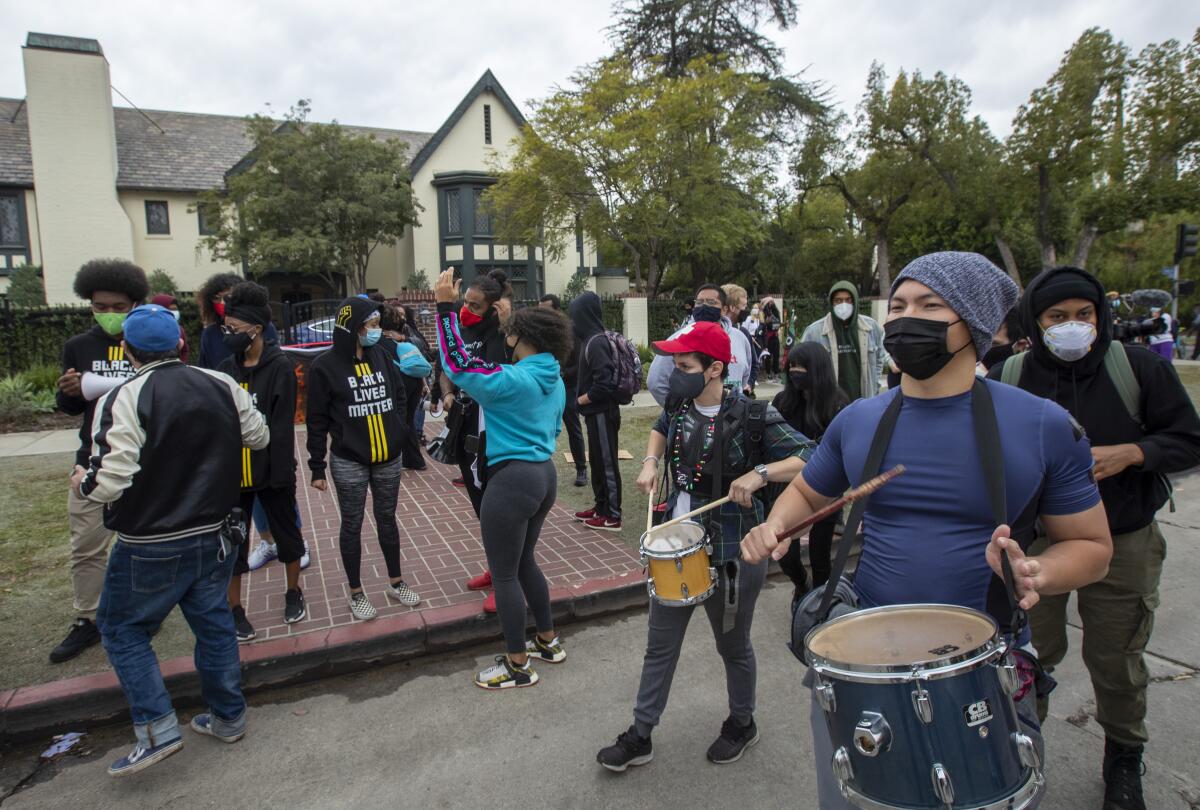
The incident Sunday at Martinez’s home occurred hours after a large rally in Santa Monica by groups opposed to vaccination mandates.
Hours after an anti-vaccination rally in Santa Monica, protesters targeted the homes of Los Angeles City Council President Nury Martinez and City Councilman Mitch O’Farrell.
At one point during the rally, a man held up a sign that he said showed the home address of each City Council member, according to video posted on social media. If council members voted for a vaccination mandate, protesters would show up, the man said.
“Whoever votes yes, we’re coming to your door,” the man said in the video. “We’re coming to your home. You want to intimidate us? We’re coming to you now.”
At another point, he said that if the vaccination mandate passes, activists should “get your guns.”
The City Council voted recently to draft a law that would require people to have at least one dose of a COVID-19 vaccine to visit indoor restaurants, bars, gyms, shops and movie theaters. The plan has not been finalized, and the proposed law still needs approval from the full council.
One caller to Tuesday’s council meeting, who identified himself as Dan, attacked the proposed vaccination rules, saying council members have no right to force people to undergo “any kind of medical procedure” before participating in certain public activities.
“None of us wants civil war,” the caller said. “None of us want violence. But you are the ones initiating it, so you need to back off now.”
The council’s proposal quickly drew criticism from activists who have gathered in politicians’ driveways or marched outside their homes over the past year.
Kenneth Mejia, who is running for city controller in the June 2022 election, appeared with protesters last week outside Councilman Paul Krekorian’s house in the San Fernando Valley. Mejia and others have been demanding that Krekorian support a proposal to have the city purchase a 124-unit building in Chinatown where tenants are facing major rent increases. The protest outside Krekorian’s home ended shortly before 9:30 p.m., Mejia said.
For politicians, getting yelled at in a restaurant or having protesters show up on their doorstep “comes with the territory,” Mejia said.
“People have a right to protest outside elected officials’ homes, especially since many of those times … they don’t want to meet with us,” he said.
Times staff writers Emily Alpert Reyes and Kevin Rector contributed to this report.
More to Read
Sign up for Essential California
The most important California stories and recommendations in your inbox every morning.
You may occasionally receive promotional content from the Los Angeles Times.
